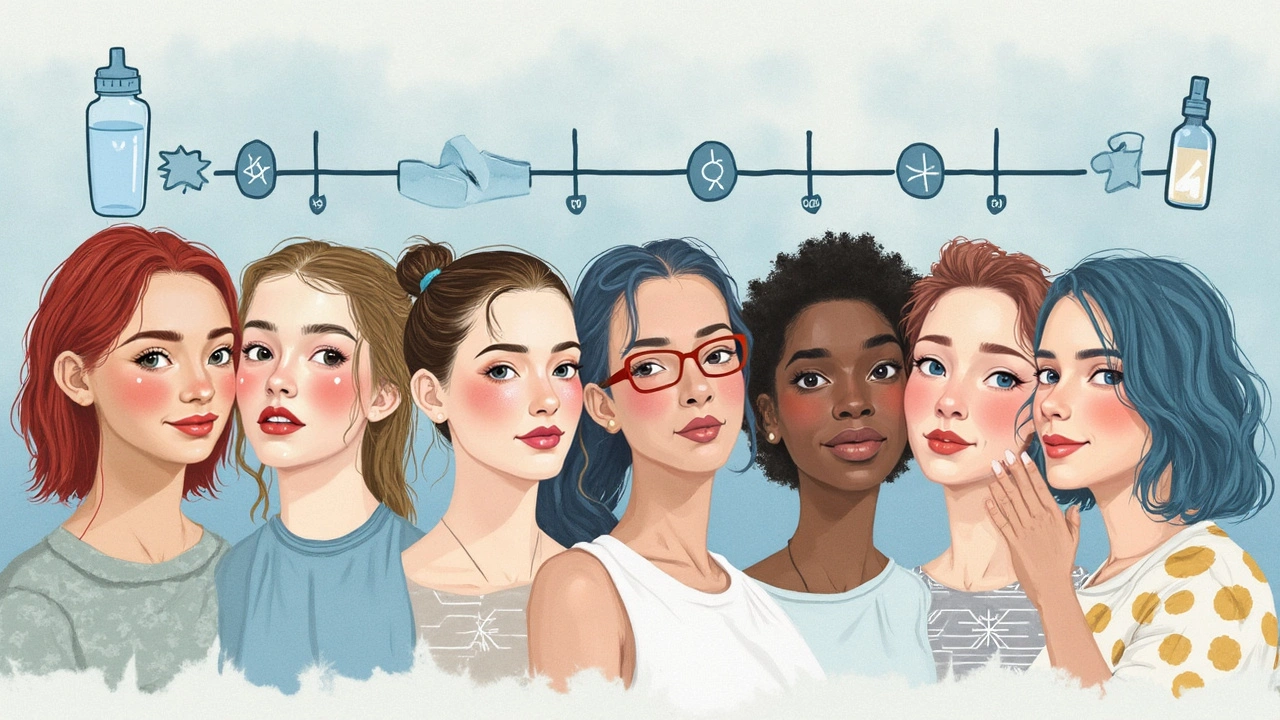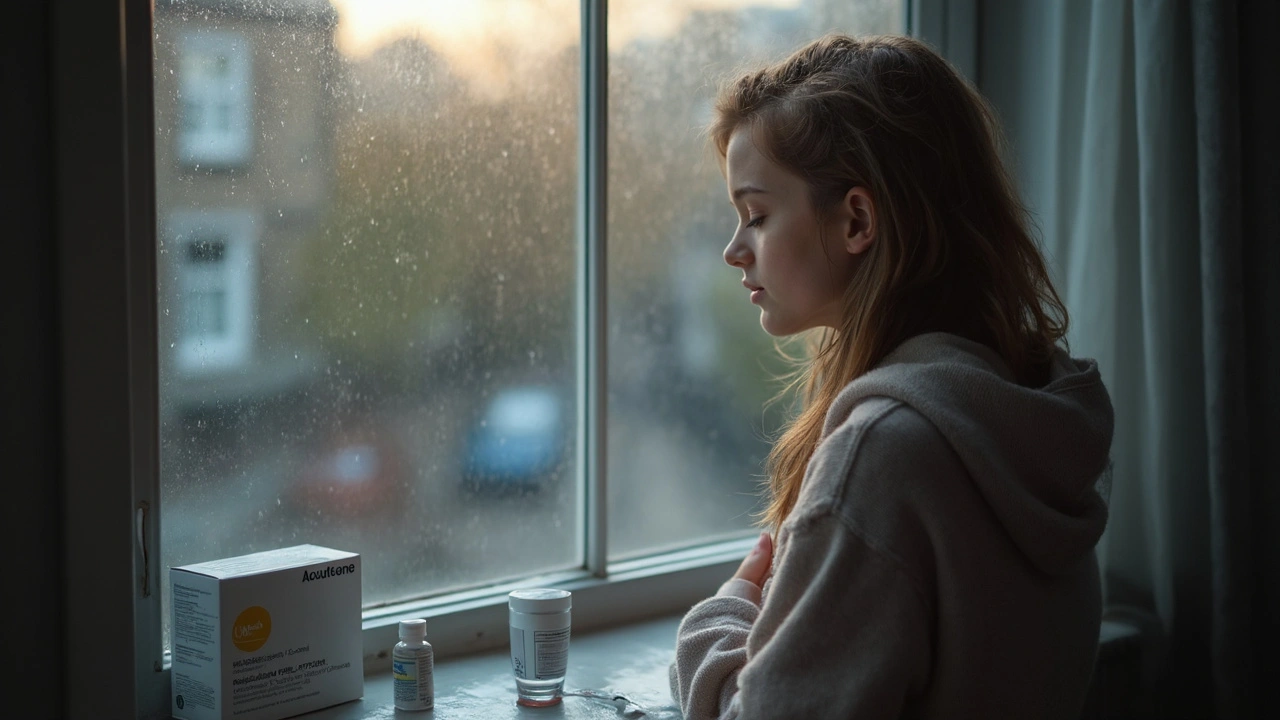Imagine waking up, looking in the mirror, and not seeing stubborn, angry pimples everywhere. That’s the promise dangled in front of millions who hear about Accutane. But behind every before-and-after selfie on Instagram, there’s a long story—one with a few bumps and surprises along the way. This isn’t just a skin care trend. Accutane has been the last resort, the “nuclear option,” for people who’ve tried everything from prescription creams to antibiotics and still battle relentless breakouts. If you’re curious what this pill really does to your body and mind, and how people get through it, buckle up.
What is Accutane and Why Do Doctors Prescribe It?
The brand name "Accutane" is almost a legend now. If you dig a little, you’ll find it’s actually called isotretinoin. Doctors started using it in the 1980s for people with severe or cystic acne—those deep, painful pimples that just won’t quit. Isotretinoin is a form of vitamin A and works by shrinking sebaceous glands, the little oil factories inside your skin. The less oil, the less food for acne bacteria, so that chronic inflammation settles down.
Here’s what makes isotretinoin different: It doesn’t just mask symptoms. For most people, it aims to hit acne where it starts and keeps it away for years. Clinical trials show up to 85% of patients see their acne vanish after one course. That stat alone is why dermatologists still reach for it when nothing else cuts through the mess.
But Accutane isn’t handed out like candy. You need a prescription, and before that, a long discussion about birth control, blood tests, mental health checks, and the possibility of gnarly side effects. There’s even a federal program—iPLEDGE in the U.S.—to make sure patients, especially women, don’t get pregnant while on it, because the risk of birth defects is sky-high. The system is strict for a reason, but it keeps everyone safe. For many, the chance of clear skin outweighs months of discomfort. Still, the ride can get wild.
Table: Prevalence and Success Rates of Accutane Use
| Country | Prescriptions per Year | Success Rate (Clear Skin After 1 Course) |
|---|---|---|
| USA | Over 500,000 | ~85% |
| UK | ~60,000 | ~82% |
| Australia | ~40,000 | ~81% |
Doctors weigh the benefits and double check if you really need it. Accutane isn’t for mild acne or impatient TikTok fads. It’s for when breakouts take over your social life, self-esteem, and scars keep piling up.
What Does Taking Accutane Really Feel Like?
Day one? You probably won’t feel any different. Fast forward a couple weeks, and things get interesting. Lips start to peel—seriously, no amount of chapstick seems enough. Your skin could start flaking off in supermarket lines. Friends might notice dry, bloodshot eyes or ask why you’re always sipping water. Dryness hits everywhere—nose, mouth, arms, even inside ears.
Here’s something weird: Acne often gets worse before it gets better. That “purge” phase is when breakouts flare up from deep inside the skin. People say their pimples seem angrier than ever for a month or two, then slowly fade. It’s tough mentally. You’d think a miracle drug means instant results, but with Accutane it’s patience or bust.
Up to half of users report some aches—joints and back can feel extra ouchy, especially if you’re active or into sports. Sun becomes your nemesis. Even a stroll can roast your skin. Sunscreen isn’t optional now. Some days, nosebleeds sneak up thanks to fragile skin inside nostrils. It’s glamorous, right?
But then, slowly, there’s a shift. The endless oil on your cheeks and forehead dries up. Fewer new pimples pop out. Old scars look less red. For many, it’s like coming out the other side of a storm. By month four or five, it’s not uncommon to want to weep with relief. No more hiding behind hair or makeup. Confidence starts to peek through for the first time in years.

The Side Effects People Don’t Talk About Enough
Let’s not sugarcoat it. Isotretinoin has a reputation for a reason. The common stuff—dry lips and skin—is just the start. Ever heard of your cholesterol and liver enzymes spiking? Blood work every month keeps tabs on this. Some people need a diet overhaul to keep things steady. Skin might heal slower, so cuts or bruises stick around longer.
Mental health is a big, gray area. Years back, some news reports linked Accutane to depression and mood swings. Newer research hasn’t proven a direct link, but dermatologists never take risks here. Anyone with a history of depression or anxiety has extra check-ins. Lots of people say their moods never changed, while others admit the isolation of acne mixed with dry, sensitive skin did take a toll.
Fertility questions pop up sometimes, but Accutane actually leaves your ability to have kids untouched—unless you get pregnant while taking it, which is a catastrophic risk. Doctors make it crystal clear: double up birth control, test for pregnancy each month, and never gamble. Birth defects are not a maybe; they’re nearly guaranteed if a fetus is exposed.
Another curveball: muscle aches affect more people than you’d think. Gym routines get shelved for a while. Some folks notice thinning hair, especially near the end of a long course. Good news? For most, hair bounces back. If you already have eczema, get ready—it often flares. And if you wear contacts, keep spare glasses handy, because dry eyes and contacts just don’t mix.
Real-Life Tips for Surviving Accutane
You can survive—thriving takes a few hacks. Chapstick isn’t a luxury; it’s a survival tool. Aquaphor, Vaseline, or lanolin-based balms work where regular lip balms fail. Stock up and keep tubs everywhere: car, desk, nightstand.
Moisturizer selection gets serious. Fragrance-free creams with ceramides or hyaluronic acid help skin stay happy. The heavier, the better. Skip anything labeled as "anti-acne." Your old routines aren’t going to cut it. Washing less and switching to gentle cleansers helps avoid turning your face into sandpaper.
Sunscreen, every single day. SPF 50+ with zinc oxide is the go-to. Even cloudy days can trigger sunburns on isotretinoin.
Water bottles become your best friend. Hydration from the inside makes skin less cracked.
Nasal sprays fight against crusty, bloody noses. Humidifiers at night can stop your bedroom from turning into the Sahara.
If you work out, listen to your body. Ease up on heavy weights if joints scream at you.
Social life tip: If you’re self-conscious about dry, flaky skin, a little makeup or a plain moisturizer under foundation gives you back that glow … kind of.
Don’t ghost your dermatologist. Always share what’s happening, even if it’s embarrassing. They’ve seen it all before. Monthly visits feel tedious but catching side effects early keeps things on track.
- Invest in thick, fragrance-free body creams—your shins and elbows will thank you.
- Use a silk pillowcase to reduce irritation from dry skin at night.
- Keep a soft toothbrush to avoid hurting cracked lips while brushing.
- Stay alert for changes—aches, vision problems, intense mood swings—report anything unusual fast.
- Don’t skip blood tests, even if you hate needles.
- Celebrate milestones: first week, first clear cheek, last pill!

What Happens After Your Last Pill?
It feels like a finish line, but recovery from *Accutane* isn’t an overnight flip. For a few months, your skin stays on the drier side and may still look pink or delicate. Here’s the thing: up to 20% of people get some pimples back, but most never see the old cystic acne again. Some dermatologists offer second, shorter courses if breakouts slowly creep up. The rules change after Accutane. Waxing, intense chemical peels, or laser treatments should be delayed 6-12 months, because your skin’s still fragile and prone to scarring.
Scarring often looks less angry now, and redness fades as healing speeds up. Makeup glides on instead of caking. People talk about a confidence boost nobody predicted—trying new hairstyles, posting unfiltered photos.
The aftercare now is about maintenance, not fighting an uphill battle. Gentle cleansers, simple moisturizers, and sunscreen keep skin steady. Sometimes low-dose retinoids (which are way less intense than isotretinoin) help keep pores clean. Your doctor might check cholesterol and liver numbers once more, then say goodbye until the next check-in.
The social side is wild, too—old friends who never commented on your acne now compliment clear skin. Some deal with lingering hyperpigmentation, but with time and TLC, most spots fade. There’s an adjustment to having “normal” skin. Surprises like getting carded at bars more often (because acne wasn’t there to age you!) or discovering new hobbies that you avoided in the past because of breakouts—it’s emotional. And yes, not everyone stays totally clear. A few get tiny breakouts again, but rarely like before Accutane.
The bottom line? For those who need it, Accutane offers a shot at clear, healthy skin when almost everything else fails. It comes with a load of rules and some personal sacrifice, but millions swear those months are worth it. If you’re about to start or halfway through, stock up on moisturizers, keep your doctor on speed dial, and remember—it really does get better on the other side.


Comments
I have to say, I found the whole Accutane experience quite daunting at first. Reading these real stories really helps shed light on what to expect beyond just the typical side effects we hear about. What I really appreciate is how the article digs into the lesser-known side effects. It’s so rare to get that kind of honesty.
One thing I wish they talked about more explicitly is the emotional side of taking Accutane. I know it's physical side effects we worry about the most, but mood swings and feeling off mentally can be just as challenging.
I’m also curious about what skincare routines worked best for people on Accutane? Did anyone find some products that actually helped or was it mostly about sticking to basics?
Overall, this was a solid read but I feel like more guidance tailored to different skin types would be beneficial too. Thoughts?
Honestly, I’m skeptical about glorifying Accutane without thoroughly discussing the risks. Yes, it’s effective, but the article should stress the importance of medical supervision more strongly. People might rush into it thinking it’s a magic fix, which it is not.
From a grammatical standpoint, the article was fine, but some of the anecdotes felt exaggerated and lacked precise evidence. We need more scientific references when discussing those side effects, especially the rare ones mentioned.
Also, the language needs to be clearer: 'smart tips' is vague. What exactly are these tips? If someone is desperate for clear skin, they deserve detailed instructions rather than general advice.
Accutane is not a decision to take lightly. The article should emphasize the ethical responsibility of informing patients fully.
Ugh, this topic really hits home for me!!! I’ve seen so many people glamorizing Accutane and brushing over the emotional rollercoaster. Yes, having clear skin is great, but have you ever felt like you’re stuck in a nightmare of dry skin, fatigue, and those awful mood swings??
It’s like, people expect you to just grin and bear it as if it’s a minor inconvenience, but it really messes with your confidence and mental health. Honestly, the article brushes the surface; it should go harder on these aspects.
Also, I’m really annoyed that some people treat Accutane as a quick fix without acknowledging that it demands patience and care, not to mention how isolating it can feel.
We need more brutal honesty about the side effects and support systems while on this journey!
Hey folks, just wanna jump in and say that while there are challenges with Accutane, it really can be a lifesaver! :) I’ve coached a few friends through their journeys and the key was solid support and following the doctor’s guidelines strictly.
One tip that always helped was keeping the skin moisturized with gentle products and drinking plenty of water. Side effects like dryness and peeling were manageable, but being consistent made a big difference.
Also, staying connected with others going through it helps a lot — just knowing you’re not alone is huge.
Has anyone else found ways to cope with the emotional swings? I’m curious what worked best for you guys.
Accutane is definitely not for the faint-hearted, but I appreciate the article's encouraging tone. It’s good to be well informed about what you’re getting yourself into, and this piece does a reasonable job at that.
I agree with earlier comments that emotional changes are an important factor; however, every patient’s experience varies. For some, it’s manageable, while others may struggle more profoundly.
One thing I recommend is setting realistic expectations and having a thorough consultation with your dermatologist. The right dosage and monitoring are critical to minimizing side effects.
Feeling motivated to take proper care of yourself mentally and physically throughout the process is just as vital for success.
OMG, this article made me tear up a bit because I’ve been there! Accutane helped me clear up my skin after YEARS of struggling with cystic acne.
But yeah, it’s no walk in the park. The dryness was insane, and my lips cracked like the Sahara desert 🌵💧. The mood swings? Real!! It’s like your body is going through a storm.
A huge tip I want to share is to use a super hydrating lip balm constantly — like, literally carry it everywhere you go.
Keep a journal or app to track your moods and skin progress. It helped me stay positive when things felt rough. Also, chat with supportive friends or online groups. You're not alone! 😊✨
This is a very balanced post. I appreciate seeing both sides of the Accutane experience — the benefits and the downsides.
One thing I’d add is the importance of following the dietary recommendations your doctor gives. Some foods can exacerbate dryness or inflammation, so it’s good to pay attention to what you eat during treatment.
Also, since this drug can affect liver function, regular blood tests are essential.
Has anyone here noticed long-term changes in their skin or health after finishing Accutane? Would love to hear some follow-up stories :)
I'd like to emphasize that while Accutane can be a game-changer, it demands respect and care, especially concerning potential side effects.
The article's real stories section is insightful, but further elaboration on how patients managed these effects would be beneficial. Sometimes, detailed protocols or strategies are what readers need.
The psychological impact is often understated. I appreciate those who shared about mood changes; this is significant for comprehensive patient support.
From a language perspective, a bit more clarity and structure in the sections covering tips could help patients better understand the dos and don'ts.
Overall, the piece is a valuable resource when supplemented by professional medical advice.
Yo, I gotta say, the pharmaceutical industry pushing Accutane too much makes me wonder if they are hiding some stuff. 🤔 People say it’s this miracle drug but is it really worth the extensive list of side effects? What if the 'smooth skin' comes at the price of your long-term health?
The article doesn’t talk about alternative treatments much, like natural remedies or lifestyle changes, which makes me suspicious about the motives behind the big push for Accutane prescriptions.
I mean, are doctors sometimes just following the money trail? Always gotta question what’s underneath the surface.
Anyone else feel that maybe this whole acne treatment scene is a bit of a racket? Let’s keep the discussion open!
Reflecting on Accutane from a more philosophical angle, it fascinates me how society prioritizes physical appearance to the extent that people undergo such serious treatments. There’s a paradox in seeking external 'clear skin' as a path to self-esteem while risking internal disturbances.
That said, I acknowledge the transformative potential of Accutane for those plagued by severe acne. Yet, the journey seems less about quick fixes and more about serious personal endurance and adaptation to side effects.
Perhaps this article could further explore the internal psychological journey accompanying the physical. Both dimensions deserve recognition.
These treatments raise questions on how we define and pursue beauty in modern culture—something to ponder deeply.
Hey all, just chiming in with some reassurance for those concerned about the emotional side effects. From what I’ve seen and experienced, the mental fluctuations are most intense in the early weeks and tend to stabilize with time.
Maintaining open communication with your healthcare provider can make all the difference — never hesitate to report any severe or persistent mental health concerns.
Also, eating well and keeping a regular sleep schedule help tremendously. Remember, this process is not only chemical but also holistic.
Lastly, community support is invaluable. Online forums, local groups, or friends who understand can offer encouragement during tough moments. You’re stronger than you think! :)